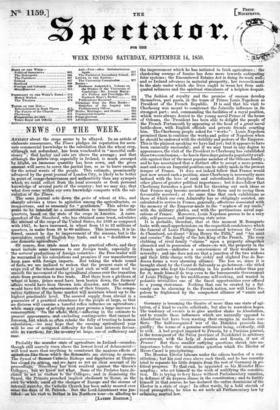The fashion of royalty and the promise of success develop
themselves, pan i passu, in the tours of Prince Louis Napoleon as President of the French Republic. It is said that his visit to Cherbourg was meant to counteract the Joinville influence in its strongest part ; and, commanding the facilities of a royal position, which were always denied to the young naval Prince of the house of Orleans, the President has been able to delight the people of the French Portsmouth by appearing at the head of a great naval battle-show, with English officials and private friends courting him. The Cherbourg people asked for " works " : Louis Napoleon promised them to continue the works and policy of Napoleon when he should be endowed with the stability and powers of the Emperor. This is the plainest speaking we have had yet; but it appears to have been eminently successful ; and if we may trust in any degree to appearances, the visit of the President to Cherbourg has established these two conclusions,—he has in three days gained a popularity avail- able against that of the most popular member of the Orleans family; and he has ascertained that a distinct offer to accept a more perma- nent and even an Imperial petition can be safely made in the present temper of France. It does not indeed follow that France would just now accord such a position, since Cherbourg is necessarily more imbued with the love of rank and subordinated discipline than other places of greater political importance ; but it does follow that Cherbourg furnishes a good field for throwing out such ideas so that France may become accustomed to them and to seeing them favourably received; at the same time that such exhibitions as those at which our own Admiralty has so obligingly assisted,. are calculated to revive in France, generally, affections associated with the memory of the Emperor-uncle to the "nephew of my uncle," with the military glories, and with the pertinacious naval aspi- rations of France. Moreover, Louis Napoleon proves to be a very able, self-possessed, and-improving state actor. It is probable, therefore, that at this moment N. Bonaparte looks with small apprehensions on the coquettish condolences which the funeral of Louis Philippe has occasioned between the Count de Chambord, soi-disant ".King Henry the Fifth," and "his aunt and cousins" the family of the late King of the French. The very clubbing of rival family " claims " upon a property altogether alienated and in possession of others—to wit, the property in the French . nation—indicates a consciousness of their weakness in severalty; and one does not see that a junction of the two widows and their little charge with the sickly and slighted Duo de Bor- deaux forms a very alarming alliance.' The less so, since it is brought about by the Count de Salvandy as go-between—the titled pedagogue who kept his Countship in his pocket rather than pay for it, made himself de trop even to the bureaucratic Government of Louis Philippe by his meddlesome self-seeking, and wasted in pedantic trivialities one of the finest opportunities ever offered to a young 'statesman. Nothing that can be created by a Sal- vandy can be alarming to the French nation, nor will Louis Na- poleon be frightened by the compactest alliance of "aunts and cousins."


























